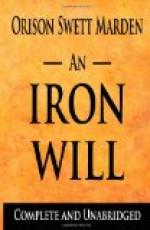James Sharpies, the celebrated blacksmith artist of England, was very poor, but he often rose at three o’clock to copy books he could not buy. He would walk eighteen miles to Manchester and back after a hard day’s work, to buy a shilling’s worth of artist’s materials. He would ask for the heaviest work in the blacksmith shop, because it took a longer time to heat at the forge, and he could thus have many spare minutes to study the precious book, which he propped up against the chimney. He was a great miser of spare moments, and used every one as though he might never see another. He devoted his leisure hours for five years to that wonderful production, “The Forge,” copies of which are to be seen in many a home. It was by one unwavering aim, carried out by an iron will, that he wrought out his life triumph.
“That boy will beat me one day,” said an old painter as he watched a little fellow named Michael Angelo making drawings of pot and brushes, easel and stool, and other articles in the studio. The barefoot boy did persevere until he had overcome every difficulty and become the greatest master of art the world has known. Although Michael Angelo made himself immortal in three different occupations,—and his fame might well rest upon his dome of St. Peter as an architect, upon his “Moses” as a sculptor, or upon his “Last Judgment” as a painter,—yet we find by his correspondence, now in the British Museum, that when he was at work on his colossal bronze statue of Pope Julius II., he was so poor that he could not have his younger brother come to visit him at Bologna, because he had but one bed in which he and three of his assistants slept together. Yet
“The star of an
unconquered will
Arose in his breast,
Serene, and resolute
and still,
And calm and self-possessed.”
CONCENTRATED ENERGY.
The struggles and triumphs of those who are bound to win is a never-ending tale. Nor will the procession of enthusiastic workers cease so long as the globe is turning on its axle.
Say what we will of genius, specialized in a hundred callings, yet the fact remains that no amount of genius has ever availed upon the earth unless enforced by will power to overcome the obstacles that hedge about every one who would rise above the circumstances in which he was born, or become greater than his calling. Was not Virgil the son of a porter, Horace of a shopkeeper, Demosthenes of a cutler, Milton of a money scrivener, Shakespeare of a wool stapler, and Cromwell of a brewer?
[Illustration: THURLOW WEED, American Journalist and Politician. b. Cairo, N.Y., 1797; d. New York, 1882.]




